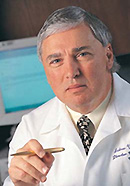
| T H E N I H C A T A L Y S T | J A N U A R Y – F E B R U A R Y 2002 |
|
|
|
Four Institute Directors Leave, but New NCI Director Named, as Budget Moves ForwardNIH STAYING THE COURSE INTO 2002 |
|
 |
|
Andrew
von Eschenbach
|
At the most recent meeting of the Advisory Committee to the NIH Director, December 6, 2001, there was much talk of disasters. NIH staff had pitched in with aid to victims of the September 11 terrorism and the floods this summer in Texas—and were coping with increased security challenges here at home.
But with all the upheaval, and despite a spate of departures by institute directors, NIH itself is on a steady course, said Ruth Kirschstein. Kirschstein now holds the record for longest time served as acting director of NIH.
Kirschstein said recent changes in institute directorships were nothing out of the ordinary in numbers or reasons for the departures. Paul Sieving, the new director of NEI, arrived in 2001 to replace Carl Kupfer, the original director of NEI, who had led the institute for 30 years. Other institute directors bowing out of their positions in swift sequence were Enoch Gordis of NIAAA, Alan Leshner of NIDA, Steven Hyman of NIMH, and Richard Klausner of NCI. Gordis was retiring at age 71, after 15 years leading his institute. Each of the other departing directors, Kirschstein observed, had left to take incomparable positions elsewhere.
Klausner stepped down as the director of NCI Sept. 28. His current plans include heading a unit on "terrorism" at the National Academy of Sciences. Leshner left NIH in December to become chief executive officer of the American Association for the Advancement of Science, the publisher of Science. Hyman, NIMH director since April 1996, also left in December, to become the provost of Harvard University, Cambridge, Mass.
Kirschstein said searches were underway for new directors for NIAAA, NIMH, and NIDA, and she expected the White House to announce its appointee to head NCI very soon. Later that day, President Bush announced that Andrew C. von Eschenbach will be NCI’s 12th director. NCI says it is expecting von Eschenbach to arrive Jan. 22.
Von Eschenbach, 60, comes to NCI from the University of Texas M. D. Anderson Cancer Center in Houston, where he was director of the Genitourinary Cancer Center and director of the Prostate Cancer Research Program.
NCI’s press release says von Eschenbach has also served as vice president for academic affairs at M.D. Anderson and as executive vice president and chief academic officer, leading a faculty of almost 1,000 cancer researchers and clinicians.
He had been slated to head the American Cancer Society, but relinquished that position before starting it, in order to lead NCI. He was unable to talk to The NIH Catalyst prior to his arrival here toward the end of January.
In a statement released by M.D. Anderson, von Eschenbach said, "My goal for the future is to accelerate making new discoveries and delivering targeted therapies as rapidly as possible to cancer patients . . . . I am keenly aware of the need to reduce the burden of cancer for those in minority and under-served populations."
If von Eschenbach’s
appointment confirmed Kirschstein’s reassurances, so also did Congressional
passage of the HHS budget for FY 2002—reported out of conference committee
on Dec. 20 and signed into law by President Bush on January 10. It provides
$23.2 billion for NIH, an increase of about 15 percent over the past fiscal
year. ![]()